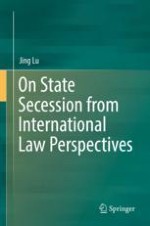2018 | OriginalPaper | Chapter
5. Improving External Involvement in the Settlement of Secessionist Conflicts
Author : Jing Lu
Published in: On State Secession from International Law Perspectives
Publisher: Springer International Publishing
Activate our intelligent search to find suitable subject content or patents.
Select sections of text to find matching patents with Artificial Intelligence. powered by
Select sections of text to find additional relevant content using AI-assisted search. powered by
